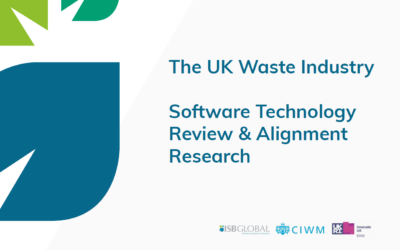Waste management companies have historically been process-driven. In order to fulfil contracts, they need to ensure they make collections on time and manage the resulting waste or recycling properly, often moving waste either onto another supplier or straight to landfill.
At a time when we need a fundamental change in the way we manage waste, however, there are untapped opportunities for the waste and recycling industry. And those opportunities are almost certainly hidden in the waste data you already collect.
Digital transformation for the waste sector
Businesses across all sectors are managing digital transformation – using technology to refine existing processes and understand how to be more efficient in the long term. Some businesses have adopted a complete transformation, while others are tackling one area of the business at a time – the pace of change is often dependent on the willingness of leaders, budget issues and the speed at which competitors are making similar changes.
Companies in the waste and recycling sector have a clear opportunity to gain a market edge, simply by understanding how to do things better, and by uncovering commercial opportunities for new revenue streams. The right approach to digital transformation can also help improve sustainability credentials and move businesses towards a circular economy approach.
Where’s your most valuable data?
Business owners understand that data collection is the best way to improve services and add value to the bottom line. But they don’t always know where that data is – or how to turn it into actionable insights that can suggest and support business decision making.
For waste and recycling companies, high-value data is often found in these places:
Customer understanding – how much visibility do you have over the details of your contracts? Do you know which customers pay on time and which ones you always have to chase? Would a clearer picture on payment collections help your cash flow planning? Do you know which customers offer an opportunity for selling additional services? In a competitive market, the more you understand about your customers, the better placed you are to retain their business and win new contracts.
Route management and logistics – this is a fundamental process for waste management companies. Poor route management increases fuel and staffing costs, impacts on service levels and can even have an impact on vehicle maintenance. The data you collect from route planning activities, and from the costs associated with collections will give you valuable insights. Use them to improve routes, rotas and staff management – you’ll save money and improve service. You’ll also be working towards your own sustainability or net zero goals.
Your supply chain – what do you know about your suppliers? Are you getting the best value for money? Are they working sustainably and efficiently, or are you losing money because your suppliers aren’t as reliable as you need them to be? Do you get discounts or rebates? Are you getting the service levels you need? Could you work more collaboratively together? Understanding this data means you can improve your supply chain, driving better customer service and brand reputation for your business.
Waste processing – is there an income opportunity from the waste you collect? Have you got the data to show waste segmentation and how you currently manage each type of waste? Could you gain from selling other items on a secondary market? This will make your business more sustainable, and contribute to a more circular-style model than a linear one. And it may make the difference in future contracts with customers who need to show they are working with a waste management company that prioritises sustainability.
Financial management – waste management businesses often use several different systems for managing finance. From Excel spreadsheets to general accountancy software, it can be difficult to align your financial data so that you have a clear picture of what’s coming in and out of the business at any one time. For many companies, this is the place to start collecting that valuable data. Gaining those commercial insights can often have an immediate impact on your finances.
Find out more about how centralising and analysing the data in your business can identify opportunities for efficiencies and new revenue by checking out our Waste & Recycling One solution.






